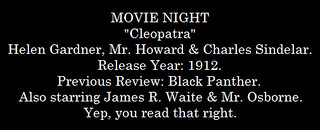
Review #1051: Cleopatra.
Cast:
Helen Gardner (Cleopatra - Queen of Egypt), Mr. Howard (Pharon), Charles Sindelar (Mark Antony), James R. Waite (Venditius - A Roman soldier), Mr. Osborne (Diomedes), Harry Knowles (Kephren - Captain of the Guards to the Queen), Mr. Paul (Octavius - A Triumvir and General), Mr. Brady (Serapian - An Egyptian priest), Mr. Corker (Ixias - Servant to Ventidius), Pearl Sindelar (Iras - An attendant), Miss Fielding (Charmian - An attendant), Miss Robson (Octavia - Wife of Antony), and Helene Costello (Nicola - Child) Directed by Charles L. Gaskill.
Review:
You may notice that there is quite a bit of history citing in this review that I think helps give a bit of context to the film and its historic nature that I hope informs you without being detracting to the quality of the review.
It is quite an achievement to note the age of a film like this, which as of this year is 106, with this being the oldest movie ever covered by me on Movie Night along with being the 11th from the 1910s. It is one of the earliest feature films, with examples of feature length movies (in this case being ones that lasted nearly or longer than a hour) including L'Inferno (1911) from Italy, Defence of Sevastopol (1911) from Russia, and Richard III (1912), a French-American production that had been released a month prior to this film (here is a fun fact: the first dramatic feature movie was The Story of the Kelly Gang (1906) that was made in Australia). This was produced by The Helen Gardner Picture Players (one of the first film production companies set up by a woman) that was adapted from the 1890 play Cléopâtre by Victorien Sardou, and the movie has a stagey feel to it that isn't surprising to say the least. Admittedly, this is more of a curiosity piece than anything, but is there anything wrong with wanting to see a capsule of something from an era long gone? Particularly one that has managed to survive to this very day, unlike the 1917 version of Cleopatra (which starred Theda Bara while being an adaptation of a novel of the same name), which was lost after the Fox studios vault fires of 1937, with Gardner's film being re-released the following year in order to compete with that edition, with two inter-titles being subjected to cuts by censorship boards: "If I let you live and love me ten days, will you then destroy yourself?" and "Suppose Anthony were told that she had just left the embraces of the slave Pharon", so make of that what you will.
In any case, this film begins with a title card that states that certain stage traditions haven't been considered when making this movie, as the director's goal is to insure naturalness while making a romantic atmosphere, with the Author's goal being to try and capture the qualities of the woman "devotedly loved by Julius Caesar", with freedom being taken in the adaptation. I can't say I've read that kind of title card before. Gardner is the most noteworthy person in the film, and she manages to do a good job in keeping our interest, and it should be noted that she designed her costume herself along with serving as editor (imagine an actor/actress doing that in this day and age), which is certainly interesting. The rest of the actors do the kind of job you'd expect, somewhat stagey but never too boring to watch on screen. The camerawork isn't any too special, but for the time it was made it is fairly respectable. The title cards (of which there are dozens of) lend a hand to telling the story that manages to feel useful without being too intrusive. If there is anything that can be said about this film, it can be that this is a fairly ambitious product of its time, being quite an achievement for the era that it was made in without becoming a relic not worth looking over. This was a movie that played in theatrical roadshows and even opera houses. It isn't a hard film to find due to being in the public domain, though I will state that it is best to make sure to watch one with a music score (obviously). Is it primitive? In some ways you could say that, but for 1912, I'm sure it must've been quite the charmer in terms of entertainment. I can't say that this is anything too great nor anything too awful, but I can definitely say that it is something that is worth checking out, even if only to see something that manages to have some appeal after a century since its release.
Overall, I give it 7 out of 10 stars.

No comments:
Post a Comment